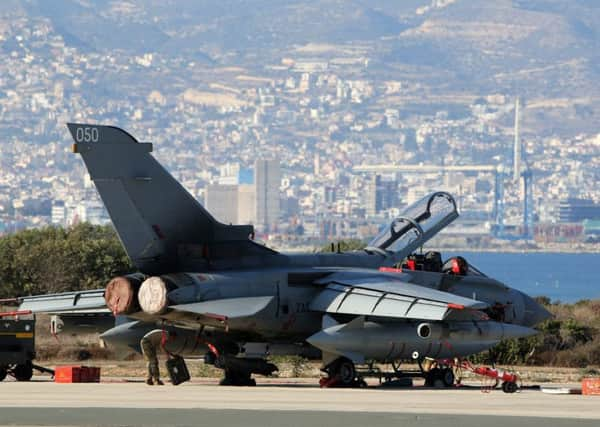David Cameron: Anti-IS forces on ground ‘not ideal’


He told MPs sceptics of military action were “correct” to warn there were not enough troops and not all of them were in the right place. He said there were an estimated 70,000 non-extremist Syrian opposition forces on the ground.
The Prime Minister said: “We are not dealing with an ideal situation but let me make a series of important points.
Advertisement
Hide AdAdvertisement
Hide Ad“First, we should be clear what air strikes alone can achieve – we don’t need air strikes to target the supply of oil which Daesh uses to fund terrorism.
“We don’t need ground troops to hit Daesh headquarters, their infrastructure, their supply routes, their training facilities, their weapons supplies.
“So irrespective of ground forces, our RAF can do serious damage to Daesh’s ability right now to bring terror to our streets and we should give them that support.”
Mr Cameron added the proposed transitional government in Syria, which would take control of the Syrian Army, would be the “natural partners” for the West.
But he said waiting for this to appear was not possible.
The Prime Minister said: “Last week I told the House we believe there are around 70,000 Syrian opposition fighters who do not belong to extremist groups and with whom we can co-ordinate the attacks on Daesh.
“I can’t risk the safety of these courageous groups, who are being targeted daily by the regime or by Daesh, or by both.
“But let me say a little more. The 70,000 is an estimate from the joint intelligence committee, based on a detailed analysis updated on a daily basis and drawing on a wide range of open source and intelligence.
“Of these 70,000, the majority are from the Free Syrian Army. Alongside the 70,000 there are some 20,000 Kurdish fighters with whom we can also work.
Advertisement
Hide AdAdvertisement
Hide Ad“I’m not arguing that all of these 70,000 are somehow ideal partners. Some though left the Syrian Army because of Assad’s brutality and they clearly can play a role in the future of Syria.
“That is a view taken by the Russians as well.”
Of the 70,000 figure, he added: “That figure does not include a further 25,000 extremist fighters in groups which reject political participation and reject co-ordination with non-Muslims.
“So, although they fight Daesh, they cannot and will not be our partners. There are ground forces who will take the fight to Daesh and in many cases we can work with them and can assist them.”
He added: “If we don’t act now, we should be clear there’ll be even fewer ground forces over time as Daesh will get even stronger. In my view, we simply cannot afford to wait, we have to act now.”
Labour leader Jeremy Corbyn said: “The Prime Minister has failed to convince almost anyone that even if British participation in the air campaign would tip the balance, that there are credible ground forces able to take back territory now held by Isil. In fact, it’s quite clear there are no such forces.
“Last week, the Prime Minister suggested that a combination of Kurdish militias the Free Syrian Army would be able to fill the gap. He even claimed a 70,000-strong force of moderate FSA fighters were ready to co-ordinate action against Isil with the Western air campaign. That claim has not remotely stood up to scrutiny.”
Mr Corbyn said Kurdish forces are a “distance away” while most of the FSA works with a wide range of groups, which “few, if any, would regard as moderate” and operate in parts of the country not close to IS territory.